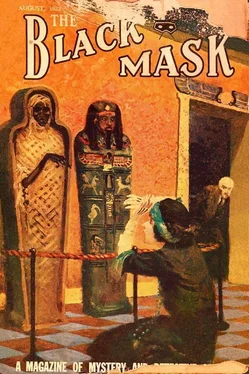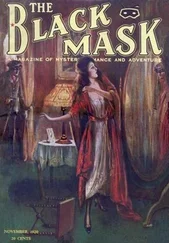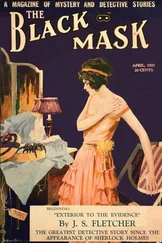John Baer - The Black Mask Magazine (Vol. 5, No. 5 — August 1922)
Здесь есть возможность читать онлайн «John Baer - The Black Mask Magazine (Vol. 5, No. 5 — August 1922)» весь текст электронной книги совершенно бесплатно (целиком полную версию без сокращений). В некоторых случаях можно слушать аудио, скачать через торрент в формате fb2 и присутствует краткое содержание. Город: New York, Год выпуска: 1922, Издательство: Pro-Distributors Publishing Company, Жанр: Детектив, на английском языке. Описание произведения, (предисловие) а так же отзывы посетителей доступны на портале библиотеки ЛибКат.
- Название:The Black Mask Magazine (Vol. 5, No. 5 — August 1922)
- Автор:
- Издательство:Pro-Distributors Publishing Company
- Жанр:
- Год:1922
- Город:New York
- ISBN:нет данных
- Рейтинг книги:4 / 5. Голосов: 1
-
Избранное:Добавить в избранное
- Отзывы:
-
Ваша оценка:
- 80
- 1
- 2
- 3
- 4
- 5
The Black Mask Magazine (Vol. 5, No. 5 — August 1922): краткое содержание, описание и аннотация
Предлагаем к чтению аннотацию, описание, краткое содержание или предисловие (зависит от того, что написал сам автор книги «The Black Mask Magazine (Vol. 5, No. 5 — August 1922)»). Если вы не нашли необходимую информацию о книге — напишите в комментариях, мы постараемся отыскать её.
The Black Mask Magazine (Vol. 5, No. 5 — August 1922) — читать онлайн бесплатно полную книгу (весь текст) целиком
Ниже представлен текст книги, разбитый по страницам. Система сохранения места последней прочитанной страницы, позволяет с удобством читать онлайн бесплатно книгу «The Black Mask Magazine (Vol. 5, No. 5 — August 1922)», без необходимости каждый раз заново искать на чём Вы остановились. Поставьте закладку, и сможете в любой момент перейти на страницу, на которой закончили чтение.
Интервал:
Закладка:
The evidence hedged Dennison in, closer and closer. If it hadn’t been for Margaret Harrington, though, he might have pulled out, somehow.
Margaret Harrington had been engaged to be married to Stuart Dennison. She was ready to announce the engagement. She had expected him to call on her that Thursday evening. He was to come about six and they were going out to dinner. Dennison arrived a little late and she had noticed immediately something odd about his actions. One thing, especially — his mouth and teeth were stained blue — as if from blueberries. She had teased him about it. He had seemed nervous, and, instead of laughing if off, hadn’t even admitted eating pie, but had changed the subject, quickly, instead. The evening had passed as they had planned.
She had seen Dennison several times during the week that followed. He had seemed about as usual, but nervous, too. Then, a week later — when Dennison was arrested — when she had read that on the kitchen table of his apartment had been found a blueberry pie with a piece cut out of it and the slice missing, she had felt that to her had been given the last link in the chain of evidence. So she had gone to the district attorney with her knowledge.
She had given up Dennison, of course, as soon as she heard of the murder. It was not only on account of the murder that she had given him up; it was on account of the whole, ugly affair. He had never told her about Miss Graham — about another woman. She might have forgiven him in the beginning, if he had confessed. But to have kept on with the other woman while he was calling on her — making her think he cared only for her. That seemed quite as bad as the tragedy, itself. So she had felt that she must not shield her former sweetheart. Her own conscience demanded that she tell what she knew about the pie.
III
No one was surprised at the jury’s decision, at the judge’s sentence, when the trial took place. Smug citizens shook their heads with satisfaction, young girls, about to err, shuddered and chose less easy paths. It worked out quite well, morally — there was a crime — a motive — apprehension of the criminal — punishment.
What did it matter that Stuart Dennison repeated over and over again the same story. He told it to the district attorney. He told it to his own lawyers. He told it to reporters. He seemed dazed, almost, at the lack of response his story received. All he could do was to go over and over his version of the affair.
Stuart Dennison’s story was, to say the least, amazing. That he couldn’t prove anything seemed the least amazing part of it. For Dennison maintained that he hadn’t been near the apartment the day of the murder. He couldn’t offer an alibi for every moment of his time. He had been in and out of his office and his club. But he was always going in and out. He had occupied his room at his club. But then, he had always kept a room there and used it more or less. Most of the club members had been away. Those who had been at the club could not testify when they had seen him. His story was simple; too simple even for those who wanted to sympathize with him. He hadn’t been near the apartment, that was all. The watch? Yes, he had given it to Miss Graham on a previous Christmas. To his knowledge it had never been broken nor mended. How could he prove that? He couldn’t. He maintained that he had left the apartment the evening before — that Miss Graham definitely knew that he was not going to return. He had packed his trunk before he had gone — had sent for it. It had been taken to his club as he said. Vacation trip? He knew of no vacation trip; had planned none. He couldn’t understand Miss Graham saying anything about that. The second trunk — the same thing... The little woman with the blonde bobbed hair, the one person who could have proved him wrong — or right — was buried long before the trial began.
Dennison did explain about the blueberry pie in a way — a peculiarly ineffective way, everyone thought. On the way to Miss Harrington’s he had passed, he said, a small pastry shop. In the window he had seen some blueberry pie. It was near dinnertime. He knew that. But he was fond of blueberry pie. He had gone into the pastry shop, eaten a small piece of pie. Later, when Miss Harrington had asked him, he had been embarrassed, had denied eating the pie. He hadn’t remembered, he explained, that his teeth and lips would look blue. At the pastry shop no one remembered him nor the pie. One waitress had gone — no one knew her name — no one else knew anything about it — so many people came in to eat pie... The pie in the apartment? He had never seen that, of course... A burglar must have come in—
The cold-blooded fact — that just before or after he had killed the woman who had been everything to him for two years — he had eaten a piece of pie that she had baked as a surprise for him, turned people against Dennison more than any other one fact of the tragedy. That much is certain.
It was a clear case, as the district attorney sketched it. The two, Dennison and Miss Graham had lived together. He had fallen in love with someone else, had threatened to leave her. There had been scenes. Then, he had promised her that things would be better — had planned the vacation trip to prove it. He had packed his trunk, had gone away. Miss Graham, all eager for his return, had packed the big trunk, sent it away, had probably telephoned to him, found out the trunk was not needed, got a wagon to call for it and bring it back, then had returned and had baked the blueberry pie. Coming in about five, on Thursday. Dennison had found her waiting. They had quarreled. He had murdered her, perhaps without meaning to do so.
The deed done, he had tried to get out of it, had disarranged things, tumbled the dressing-table drawers on the floor and bed, opened the window, taken the simple jewelry. Sometime, during the hours he spent there, he had taken the watch out of his pocket, then had forgotten to “steal” it. Before or after the murder, he had eaten the pie. He had thrust the body into the closet, washed his hands, straightened his hair — had left the apartment to call on his fiancée, Miss Harrington. A terrible, brutal deed. No wonder he was electrocuted for the crime. No wonder people shuddered as they read, avidly, details of the affair. It was brutal. It was a remarkable case, too. Perhaps it was most remarkable, though, because it happened not to be true in any particular.
IV
It was over. When Irene woke up, she realized that. When Dennison packed his trunk, the day before, and told her that he was not going to return, she knew that he would keep his word. She hadn’t been able to hold him. That was the truth of it. Now he was going to marry a society girl. Margaret Harrington! Irene had seen Margaret Harrington’s picture, even — a beautiful girl, really beautiful. There was absolutely nothing Irene could do. Dennison was gone.
“Buck up... be a good sport,” Dennison had said, and, “you have known for a long time this couldn’t go on.” Things like that.
She had been a good sport. That is, she had tried to laugh, tried to pretend that it didn’t matter. It did matter. It meant more than anything else in the world.
Not that the thing was unexpected. From the first — from two years ago when she had started — and come to Dennison’s apartment — she had known that the arrangement couldn’t last. But she had hoped — prayed — that it would. She had even thought, lots of times, that maybe Dennison would marry her, that they could settle down without this everlasting subterfuge and this constant explanation, have a home, really. Now Dennison was gone — was going to marry someone else.
She really loved Dennison — had loved him, that is. Why, she had loved him from the first time she had ever seen him there in McNally’s. She wondered how he had ever happened to notice her. He had never been in a department store since, as far as she knew. He had come in, that day, to match a bit of silk for the head-dress of a Persian costume for a charity play, and she had waited on him. She had liked him, had gladly broken a rule when he asked her and had given him her address, the address of that lonely little room in that cheap rooming house on Lexington Avenue.
Читать дальшеИнтервал:
Закладка:
Похожие книги на «The Black Mask Magazine (Vol. 5, No. 5 — August 1922)»
Представляем Вашему вниманию похожие книги на «The Black Mask Magazine (Vol. 5, No. 5 — August 1922)» списком для выбора. Мы отобрали схожую по названию и смыслу литературу в надежде предоставить читателям больше вариантов отыскать новые, интересные, ещё непрочитанные произведения.
Обсуждение, отзывы о книге «The Black Mask Magazine (Vol. 5, No. 5 — August 1922)» и просто собственные мнения читателей. Оставьте ваши комментарии, напишите, что Вы думаете о произведении, его смысле или главных героях. Укажите что конкретно понравилось, а что нет, и почему Вы так считаете.












